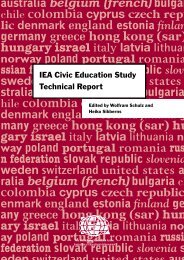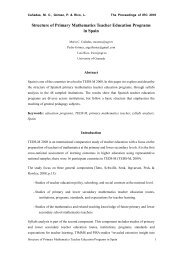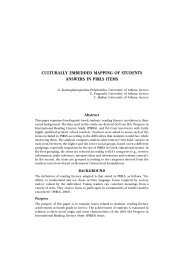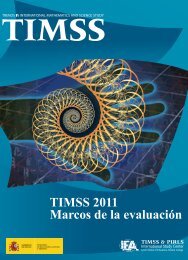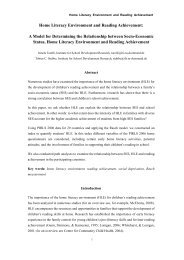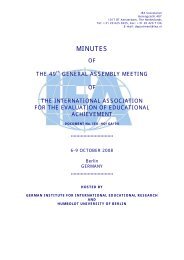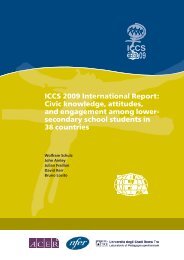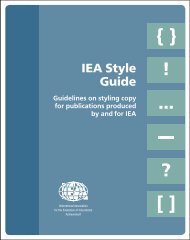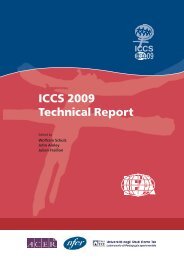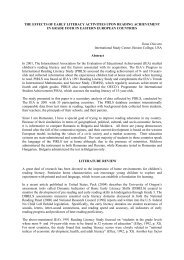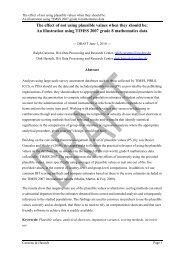Teacher Education and Development Study in Mathematics - IEA
Teacher Education and Development Study in Mathematics - IEA
Teacher Education and Development Study in Mathematics - IEA
Create successful ePaper yourself
Turn your PDF publications into a flip-book with our unique Google optimized e-Paper software.
176<br />
TEACHER PAY AND STUDENT MATHEMATICS ACHIEVEMENT<br />
Figure 73: United States, Ratio of <strong>Teacher</strong>s’ Weekly Earn<strong>in</strong>gs to Weekly Earn<strong>in</strong>gs of<br />
Comparable Professionals, 1983 to 2002<br />
1.00<br />
0.98<br />
Ratio of Weekly Earn<strong>in</strong>gs<br />
0.96<br />
0.94<br />
0.92<br />
0.90<br />
0.88<br />
0.86<br />
0.84<br />
0.82<br />
1983 1984 1985 1986 1987 1988 1989 1990 1991 1992 1993 1995 1996 1997 1998 1999 2000 2001 2002<br />
Year<br />
Note: Calculat<strong>in</strong>g estimates for 1994 <strong>and</strong> 1995 was complicated by the fact that the CPS did not <strong>in</strong>dicate<br />
imputed wages.<br />
Source: Allegretto et al. (2004, Table 7).<br />
We also used the CPS to estimate age/<strong>in</strong>come profiles for teachers by gender <strong>and</strong> level<br />
of education, compar<strong>in</strong>g their weekly earn<strong>in</strong>gs with those of scientists <strong>and</strong> eng<strong>in</strong>eers<br />
<strong>and</strong> those of all others <strong>in</strong> the labor force with the same level of education <strong>in</strong> 1995<br />
<strong>and</strong> 2000. These two years bracket a period of decl<strong>in</strong>e <strong>in</strong> teachers’ relative wages. The<br />
results are presented <strong>in</strong> Table 50 <strong>and</strong> graphically only for <strong>in</strong>dividuals with Bachelor’s<br />
degrees <strong>in</strong> Figures 74 to 77. The table <strong>and</strong> the figures suggest that the mean annual<br />
<strong>in</strong>comes of teachers (both males <strong>and</strong> females) were already lower <strong>in</strong> 1995 than were the<br />
earn<strong>in</strong>gs of scientists, eng<strong>in</strong>eers, mathematicians, <strong>and</strong> non-scientists. <strong>Teacher</strong> earn<strong>in</strong>gs<br />
became relatively even lower <strong>in</strong> 2000. Note, though, that these are annual earn<strong>in</strong>gs,<br />
so the differences are larger than the differences for weekly earn<strong>in</strong>gs because teachers<br />
work fewer weeks per year than do other professionals. Even after build<strong>in</strong>g <strong>in</strong>to our<br />
estimation eight weeks less for teachers than for other professionals (40 weeks annually<br />
versus 48 weeks), we still found a considerable difference <strong>in</strong> salary between the two<br />
group<strong>in</strong>gs. 31<br />
<strong>Teacher</strong>s <strong>in</strong> the United States are paid relatively much less than professionals <strong>in</strong> compet<strong>in</strong>g<br />
occupations. If the brighter college students who might consider teach<strong>in</strong>g mathematics<br />
or science <strong>in</strong> middle <strong>and</strong> high school can also go <strong>in</strong>to <strong>in</strong>dustry as a scientist or eng<strong>in</strong>eer,<br />
the <strong>in</strong>come they have to forego to take up teach<strong>in</strong>g is substantial.<br />
31 One of the advantages of estimat<strong>in</strong>g age–<strong>in</strong>come profiles rather than estimat<strong>in</strong>g <strong>in</strong>comes without <strong>in</strong>dicat<strong>in</strong>g age<br />
is that, on average, those <strong>in</strong> teach<strong>in</strong>g may be older than other workers. This fact biases comparisons between the<br />
earn<strong>in</strong>gs of teachers <strong>and</strong> those <strong>in</strong> compet<strong>in</strong>g occupations, with teachers apparently earn<strong>in</strong>g more than workers of<br />
the same age <strong>in</strong> other occupations.



